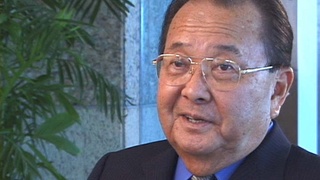Entrevistas
Memories of Manzanar
Manzanar? God, to me that was one of the worst places. I hated that place. Anyway, it was windy one day, windy the next day. That was the dust, too. And the building that we lived in, it was just full of those big knot holes. See, they weren’t covered; all the dust used to come. See, we’d wake up in the morning and there used to be about that much dirt on the floor. You know, dust.
And all we had was these little kerosene stoves. At first we didn’t know. It was so cold, so we turned that on. By morning, all the oil was gone. It’s cold, see.
And the first night we were there, there were these bunk beds or, what do you call these beds? Cots? Yeah. And then those mattresses, they call that? Straw mattress, we got bitten all over. My mother got so angry. There were little bed bugs. Oh god we got bitten. Terrible. So she had to go, she runs up there, she gives them hell over there. (chuckles). Bed bugs.
Anyway, so they changed all that. So we got another mattress. Anyway, it was a little bit better. But you know. That building, with all those holes, and every time the wind comes the dust will be blowing up, oh god that was awful. To me that was the most horrible place.
Data: May 24, 2011
Localização Geográfica: California, US
Entrevistado: John Esaki
País: Watase Media Arts Center, Japanese American National Museum









